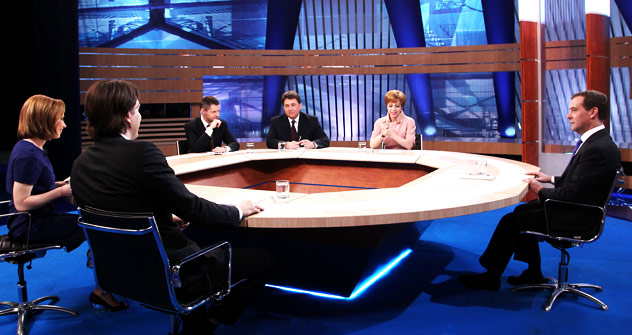Medvedev meets with TV journalists

Russia's outgoing President Dmitry Medvedev meeting with TV journalists to discuss the country's domestioc and foreign policy. Source: ITAR-TASS
As Russian President Dmitry Medvedev prepares to stepping down, journalists have begun summing up his time in office. Recently Medvedev gave a wide-ranging interview to journalists from the country’s major TV Channels including Channel 1, VGTRK, NTV, REN TV and Dozhd.
The discussion covered topics ranging from the economy, business and the country’s investment climate to politics, the protest movement, censorship, corruption and education. Yet unlike addresses Medvedev has given in the past, this time he gave more specific responses to the journalists' questions.
When asked about the hunger strike in Astrakhan, Medvedev compared to a recent American film - and the president didn't mean it as a compliment. “I have nobody to blame, but these hunger games reminded me mediocre Hollywood blockbuster,” said Medvedev. “Those involved in this [strike] pursue obvious political goals.”
Regarding the Pussy Riot scandal, Medvedev was more discreet in his assessment, saying he would be as careful as possible not to offend somebody. “Its participants got what they wanted to get – popularity,” he said.
Censorship on TV channels was also on the top of the agenda. Well-known broadcast journalist Alexey Pivovarov complained that political censorship is commonplace on Russian television, which prevents TV reporters from doing their job professionally. Medvedev's response: “Censorship is forbidden under the Russian Constitution and if there are any signs of the censorship it should be a good reason for the government interference."
The president also talked about the imprisonment of two political refugees – Mikhail Khodorkovsky and Platon Lebedev. When asked about their pardon without an official appeal, Medvedev said that such practice contradicts the Russian legislature. “Under the Constitution, there should be an appeal. If the president pardons somebody without his appeal, he violates his right for acquittal.”
Post-election protests and reported falsifications during the parliamentary and presidential elections were also among the issues discussed in the meeting. Medevedev said that he treated the protesters with respect and found their demands very reasonable. “Those who took to the streets to voice their position won [my] respect,” he said.
While speaking about the reported falsifications, Medveded said: “This is the task for the government for the future. [We should] create the situation when the violations will be minimal.”
Journalists also asked Medvedev about the reform of Russia’s Ministry of Internal Affairs. According to the president, this reform is only at the beginning stage and will requires a lot of time and effort to be completed. While speaking about military reform, Medvedev repeated that Russia's conscript-based army should be more professional. “Now the army recruiting sees changes,” he said. According to him, the vast majority of Russia's army - 85 percent - should be made up of professional soldiers, but he did not call for the abolishment of the draft, saying the force should be 15 percent conscripted.
Medvedev and the journalists also talked about Russia’s foreign policy and, particularly, about Russian-Georgian relations. Russia has close cultural and historic ties with Georgia and should maintain positive personal relations with Georgian people, the president said. At the same time he added that that Russia is at odds with Georgian president Mikhail Saakashvili. “We are ready to collaborate with his [Saakashvili’s] successor,” Medvedev noted.
All rights reserved by Rossiyskaya Gazeta.
Subscribe
to our newsletter!
Get the week's best stories straight to your inbox